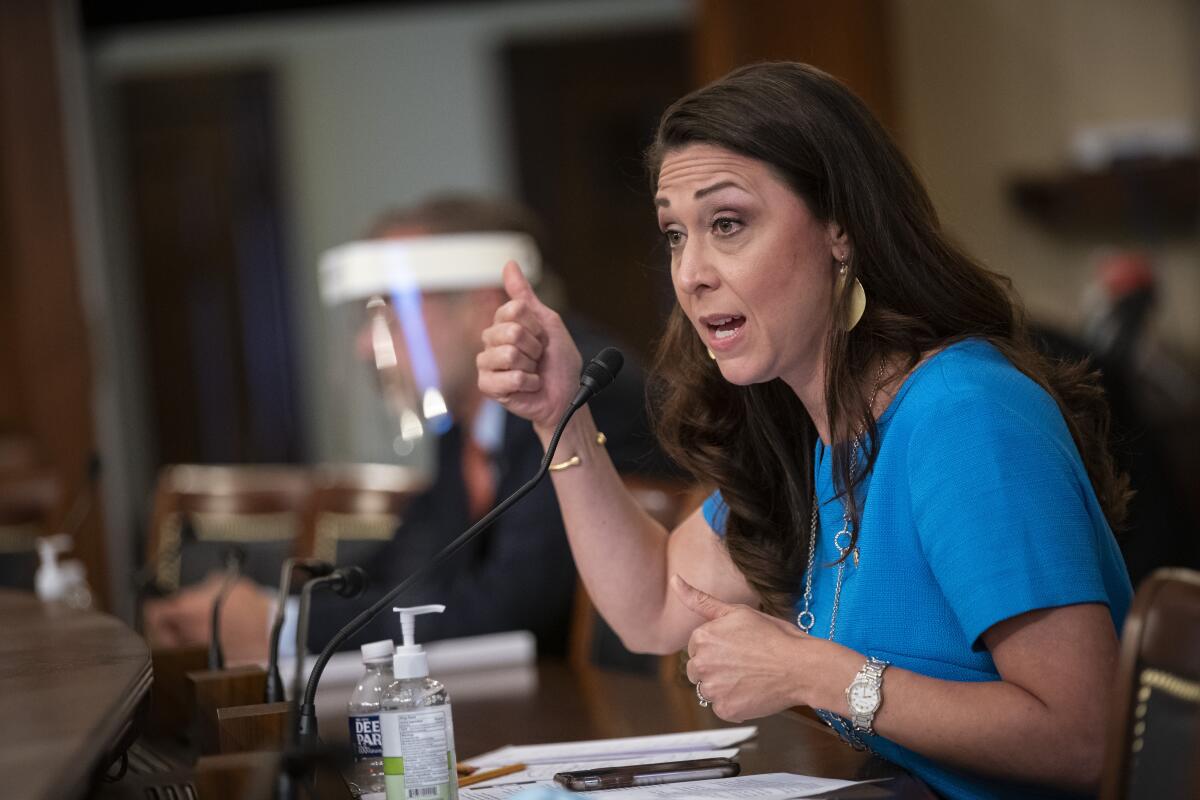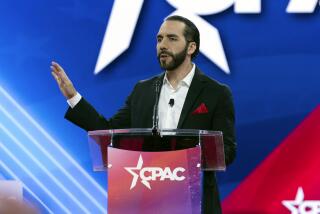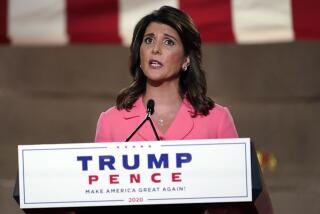Why the last GOP House member on the Pacific Coast and other moderates are voting for Trump

From the Mexican border up to Canada’s, Rep. Jaime Herrera Beutler is the last remaining Republican who represents a congressional seat that touches the Pacific Ocean.
The Washington state congresswoman has outlasted her party’s slow retreat from increasingly Democratic coastal communities by bucking her party on occasion, such as not voting for Donald Trump in 2016 because of his disparaging comments about women and immigrants from Mexico, and refusing to join the 2017 GOP push to repeal Obamacare.
But now Herrera Beutler — the only GOP Latina in Congress — says the president has earned her vote for a second term.
She is not alone. Of the three dozen or so Republican House members who said they didn’t vote for Trump in 2016, all have either left office, fallen in line or not said whether they will support the president in 2020. As Trump asks voters for a second term, there is no sitting House Republican who has publicly said they plan to vote for anyone but the president, and only one GOP senator has said he wouldn’t support Trump.
For those moderate GOP lawmakers now supporting Trump, it’s largely a matter of political pragmatism. There’s little upside to challenging Trump, who has used the past few years to reshape the GOP in his image. Taking a stand today against Trump is unlikely to win GOP moderates any votes from Democrats, and it might even backfire by depressing the GOP turnout they’ll need in November.
For four years, Herrera Beutler’s moderate politics have sometimes been at odds with Trump’s and with the rest of the Republican Party. She’s one of only 13 Republican women in the House. She wants to expand Medicaid, the government-run health program for the poor, to ensure that new mothers are covered. She believes that climate change is real and that humans are contributing to it. She’s among the House Republicans who most frequently vote against the White House’s position on legislation, including its major 2017 effort to repeal the Affordable Care Act, although she told a recent editorial board meeting with Vancouver’s the Columbian newspaper that the law should be replaced.
Herrera Beutler, who represents the rocky southwest Washington coast through the Portland suburbs to the Columbia River Gorge, has repeatedly said she doesn’t like how Trump tweets and doesn’t always agree with how “he conducts himself.”
Yet, “President Trump has done many things I agree with, like confronting the Chinese Communist Party on all of its illegal and unethical moves that undercut American workers and steal our military secrets,” she said in a written statement to The Times.
She said Trump also earned her support because of the strong economy before the pandemic, his support for congressional Republicans’ attempts to cut regulations and his efforts to “enact bills to help small businesses, single moms and a vast majority of working families.”
Herrera Beutler’s district was supportive of Trump before she was. In 2016, he won there by a margin of 49% for Trump to 42% for Hillary Clinton.
While the suburbs of Portland have voted increasingly Democratic — like voters in many suburban areas around the country — the rural parts of Washington’s third congressional district have moved in the opposite direction.
The coastal counties and other rural areas used to be blue-collar, working-class logging towns. But the mills closed and onetime lunch-pail Democrats have become Trump supporters, compensating for the decline in support in the suburbs.
Many of the Republicans who didn’t vote for Trump in 2016 have since left elected office, whether by choice or not. Some chose to retire, such as Sens. Jeff Flake of Arizona and Bob Corker of Tennessee. Others were run out of office, such as Rep. Mark Sanford of South Carolina.
Some Republicans who didn’t support Trump in 2016 are weighing the decision or won’t yet say how they plan to vote. Sen. Lisa Murkowski of Alaska said this summer that she’s struggling with her vote. Sen. Susan Collins of Maine won’t say how she voted in the primary. A handful of Republican governors didn’t support the president in 2016 but haven’t yet said how they plan to vote.
And there is thought to be only one elected Republican in Congress who has publicly said they won’t vote for Trump this fall: Sen. Mitt Romney of Utah, who also voted to convict the president in his impeachment trial this year.
For a rank-and-file Republican without the stature of Romney, opposing Trump risks turning off the Republican voters who are going to turn out to cast a ballot for him in November. And it wouldn’t garner enough Democratic votes to make up for it.
“If you’re a House Republican and refuse to support President Trump, you’re asking for your base to abandon you,” said David Wasserman, who analyzes House races for the nonpartisan Cook Political Report.
“Republicans are much more united behind the president now than in 2016. Voters have come to expect that if you have an ‘R’ next to your name, you support the president,” Wasserman added.
The Republicans who did not support Trump in 2016 but do so now, like Herrera Beutler, are toeing the line between expressing their reservations about the president and framing the choice as a binary one: between a Republican president or a Democratic one whose agenda they oppose.
Rep. Adam Kinzinger (R-Ill.), who has frequently criticized the president on Twitter, stressed that he opposes Biden’s agenda and “aligns more” with the president.
“It doesn’t mean that I have to embrace everything he says. It doesn’t mean I have to go along with everything he says,” he said on MSNBC on Sunday.
Former California Rep. David Valadao, who is hoping to recapture the Central Valley seat won by Rep. T.J. Cox in 2018, said he’s supporting Trump because he has “actually been very helpful on a lot of different fronts.”
“There is no other president who has been as helpful as he has” on water policy, Valadao said on the Trevor Carey radio show.
Democrat Carolyn Long, who is trying for a second time to unseat Herrera Beutler this year, scoffed at the idea that someone who was skeptical of Trump in 2016 could be moved to support him this year.
“We have so much more data on him as a leader, him as a person and certainly how he’s handled this pandemic as well as this economic crisis,” she said. “For somebody to go from being unwilling to throw their support to actually supporting him now with all of that data, I find perplexing.”
Chris Vance, a former chairman of the Washington State Republican Party who is now an independent, condemned Herrera Beutler’s support for Trump as nothing more than a survival tactic.
“Her strategy has been keep your head down, don’t attract attention, stay below the radar and survive,” said Vance. “It’s a wonderful strategy if all you want to do is survive.”
But surviving she is. Despite being labeled a “RINO” or “Republican in Name Only” by some conservatives in her district, she hasn’t faced tremendous backlash from voters.
Democrats are hoping to tie Herrera Beutler much more closely to the president. They stress her support for the GOP tax bill and opposition to impeachment. They also plan to emphasize that despite her 2017 vote against repealing Obamacare, she supported dozens of previous efforts to undermine or repeal the Affordable Care Act during the Obama administration.
They see an opening for Long to build on her 2018 performance — Herrera Beutler won 52.7% to Long’s 47.3%, the incumbent’s smallest reelection victory in her career.
Outside observers view Long’s chances more skeptically. Earlier this month, Herrera Beutler garnered 56% of votes in the state’s top-two primary to Long’s 40%.
“It’s doable, but it’s a long shot,” said Stuart Elway, head of Elway Research, a Seattle-based public opinion firm. “People were expecting this ‘blue tsunami’ election and it’s looking that it won’t be.”
More to Read
Get the L.A. Times Politics newsletter
Deeply reported insights into legislation, politics and policy from Sacramento, Washington and beyond. In your inbox three times per week.
You may occasionally receive promotional content from the Los Angeles Times.







